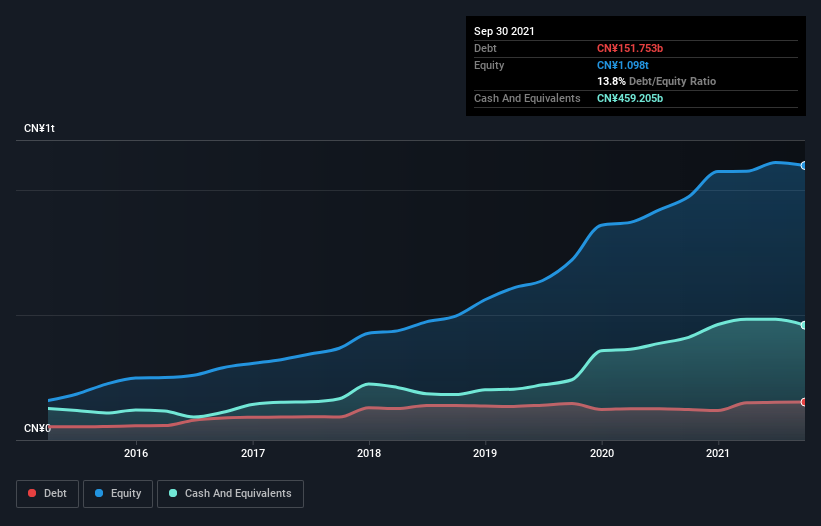Is Alibaba Group Holding (NYSE:BABA) Using Too Much Debt?
Warren Buffett famously said, 'Volatility is far from synonymous with risk.' So it might be obvious that you need to consider debt, when you think about how risky any given stock is, because too much debt can sink a company. As with many other companies Alibaba Group Holding Limited (NYSE:BABA) makes use of debt. But the real question is whether this debt is making the company risky.
What Risk Does Debt Bring?
Generally speaking, debt only becomes a real problem when a company can't easily pay it off, either by raising capital or with its own cash flow. If things get really bad, the lenders can take control of the business. While that is not too common, we often do see indebted companies permanently diluting shareholders because lenders force them to raise capital at a distressed price. By replacing dilution, though, debt can be an extremely good tool for businesses that need capital to invest in growth at high rates of return. The first step when considering a company's debt levels is to consider its cash and debt together.
Check out our latest analysis for Alibaba Group Holding
How Much Debt Does Alibaba Group Holding Carry?
The image below, which you can click on for greater detail, shows that at September 2021 Alibaba Group Holding had debt of CN¥151.8b, up from CN¥121.8b in one year. However, it does have CN¥459.2b in cash offsetting this, leading to net cash of CN¥307.5b.
How Strong Is Alibaba Group Holding's Balance Sheet?
We can see from the most recent balance sheet that Alibaba Group Holding had liabilities of CN¥387.9b falling due within a year, and liabilities of CN¥239.9b due beyond that. On the other hand, it had cash of CN¥459.2b and CN¥56.9b worth of receivables due within a year. So its liabilities total CN¥111.6b more than the combination of its cash and short-term receivables.
Given Alibaba Group Holding has a humongous market capitalization of CN¥2.16t, it's hard to believe these liabilities pose much threat. But there are sufficient liabilities that we would certainly recommend shareholders continue to monitor the balance sheet, going forward. While it does have liabilities worth noting, Alibaba Group Holding also has more cash than debt, so we're pretty confident it can manage its debt safely.
The good news is that Alibaba Group Holding has increased its EBIT by 8.7% over twelve months, which should ease any concerns about debt repayment. When analysing debt levels, the balance sheet is the obvious place to start. But ultimately the future profitability of the business will decide if Alibaba Group Holding can strengthen its balance sheet over time. So if you're focused on the future you can check out this free report showing analyst profit forecasts.
Finally, a company can only pay off debt with cold hard cash, not accounting profits. Alibaba Group Holding may have net cash on the balance sheet, but it is still interesting to look at how well the business converts its earnings before interest and tax (EBIT) to free cash flow, because that will influence both its need for, and its capacity to manage debt. Over the last three years, Alibaba Group Holding actually produced more free cash flow than EBIT. That sort of strong cash generation warms our hearts like a puppy in a bumblebee suit.
Summing up
We could understand if investors are concerned about Alibaba Group Holding's liabilities, but we can be reassured by the fact it has has net cash of CN¥307.5b. The cherry on top was that in converted 161% of that EBIT to free cash flow, bringing in CN¥154b. So is Alibaba Group Holding's debt a risk? It doesn't seem so to us. When analysing debt levels, the balance sheet is the obvious place to start. But ultimately, every company can contain risks that exist outside of the balance sheet. Case in point: We've spotted 2 warning signs for Alibaba Group Holding you should be aware of.
Of course, if you're the type of investor who prefers buying stocks without the burden of debt, then don't hesitate to discover our exclusive list of net cash growth stocks, today.
Have feedback on this article? Concerned about the content? Get in touch with us directly. Alternatively, email editorial-team (at) simplywallst.com.
This article by Simply Wall St is general in nature. We provide commentary based on historical data and analyst forecasts only using an unbiased methodology and our articles are not intended to be financial advice. It does not constitute a recommendation to buy or sell any stock, and does not take account of your objectives, or your financial situation. We aim to bring you long-term focused analysis driven by fundamental data. Note that our analysis may not factor in the latest price-sensitive company announcements or qualitative material. Simply Wall St has no position in any stocks mentioned.



